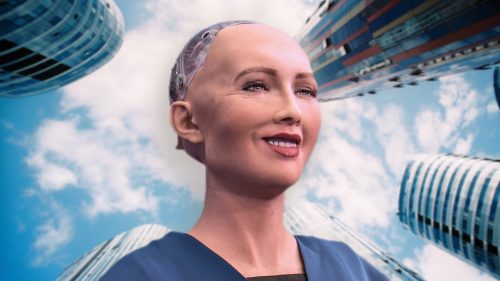Have you met Sophia, the first robot to receive citizenship?

You may or may not have heard, but the world saw the first robot obtain citizenship last fall. Although this was a historic milestone in the history of robots, it hasn't come without its lot of controversies (both about the citizenship and the praise for the robot). This left many a bit clueless about what to think or believe about Sophia. We'll let you form your own opinion from our reporting below.
Who's Sophia the robot?
Sophia is a humanoid robot developed by Hanson Robotics, a Hong-Kong based company. It was activated in 2015 and made its first public appearance in 2016 at South By Southwest (SXSW). Many AI companies were involved in its development including Alphabet (Google's parent company) and SingularityNET. The former was in charge of her voice recognition system and the latter of powering its brain. It is known for its human resemblance and was modeled from Hollywood's Golden Age actress Audrey Hepburn. According to its manufacturer and creator, Sophia uses many layers of artificial intelligence (including visual data processing and facial recognition) and human mimics (gestures, facial expressions,...) to be able to sustain a conversation with humans. Thanks to SingularityNET's software, it also can also benefit from machine learning, and learn from its interactions to improve over time. Its camera systems allow it to recognize individuals, follow faces, and sustain eye contact. It even beat Jimmy Fallon to a game of Rock-Paper-Scissors on national TV. In January 2018 it was upgraded with legs and the ability to walk. It has seven "siblings", all created by Hanson Robotics, but it is the most advanced one.How did it get citizenship and what does it imply?
In October 2017, the robot was officially granted citizenship by the Kingdom of Saudi Arabia during a program at the Future Investment Initiative - a networking event between rich Saudis and inventors. It was a historic feat for the robot to be the first in the history to receive citizenship.
The robot declared on this occasion that it was "very honored and proud for this unique distinction…It is historic to be the first robot in the world to be recognized with citizenship". Later, it declared that it wanted to use its unique position to fight for women's rights in the Gulf nation.
Following that citizenship announcement, Tokyo granted a chatbot official residence status in the Shibuya ward of the city. The European Parliament is also considering the possibility of declaring some robots "electronic persons". This trend of personifying and anthropomorphizing robots is not baseless. One of the legal challenges of AI and robotics is to define the person responsible for the actions of an autonomous machine. By giving robots a legal status, whether it is citizenship or defining them as electronics persons, a solid step is being taken in the direction of recognizing the autonomous machines as responsible entities.
What are the controversies around Sophia?
Many controversies arose from this announcement. Many pointed out that the citizenship had been granted to a machine while it's still not possible for foreign workers (about 33% of the Kingdom of Saudi Arabia's population) or children of Saudi women married to foreigners or non-muslims to obtain it. Even more infuriated people asked why the country would make a robot a citizen while denying women equal rights. Ali al-Ahmed, director of the Institute for Gulf Affairs, even told Newsweek "Women [in Saudi Arabia] have since committed suicide because they couldn’t leave the house, and Sophia is running around". The consensus seems to be that this was nothing but a publicity stunt. One that damaged the public understanding of how AI works and what it implies, and created a legal void which could go as far as challenging the very notion of human rights itself. The other main controversy around Sophia is about its actual capacities and intelligence. According to experts, Sophia should at best be classified as a chatbot with a face. Many experts in the AI field disapprove the hype surrounding the robot. For The Verge, Sophia's capacity for consciousness is exaggerated by Hanson Robotics which "gross misleads" the public opinion. Last but not least, Yann LeCun (Facebook's Director of Artificial Intelligence Research and Professor at Collège de France) tweeted in January 2018 : https://twitter.com/ylecun/status/949029930976862209 An overhyped portrait, while sounding harmless, could actually prove to be the base for terrible choices leading to ineffective and harmful policies. Needless to say that, despite its omnipresence in the news about robotics over the last 6 months (only challenged by Boston Dynamics videos), Sophia is a very controversial machine. While sensationalism might depict her as a humanoid on par with science fiction movies, we have to remain cautious about its real abilities and the political agenda carried by its citizenship.Thanks for helping to keep our community civil!
Notify staff privately
You flagged this as spam. Undo flag.Flag Post
It's Spam
This post is an advertisement, or vandalism. It is not useful or relevant to the current topic.
This post is an advertisement, or vandalism. It is not useful or relevant to the current topic.
You flagged this as spam. Undo flag.Flag Post



